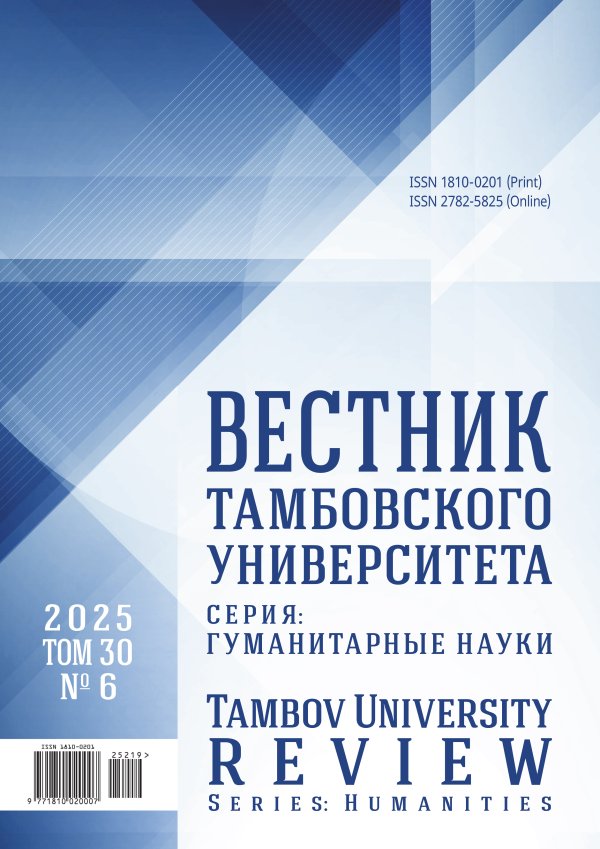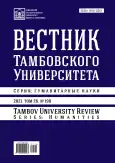К вопросу о политических технологиях викторианской Англии: концепт «джинго» в издательской практике журнала “Punch” (1878–1879)
- Авторы: Дронова Н.В.1
-
Учреждения:
- ФГБОУ ВО «Тамбовский государственный университет им. Г.Р. Державина»
- Выпуск: Том 26, № 190 (2021)
- Страницы: 223-234
- Раздел: ИСТОРИЯ ЗАРУБЕЖНЫХ СТРАН
- URL: https://journal-vniispk.ru/1810-0201/article/view/298350
- DOI: https://doi.org/10.20310/1810-0201-2021-26-190-223-234
- ID: 298350
Цитировать
Полный текст
Аннотация
Исследованы логика и приемы использования в издательской практике журнала “Punch” концепта «джинго» в качестве инструмента политических технологий, ориентированных на формирование общественного мнения по ключевым вопросам внешней политики и электорального поведения в Великобритании в 1878–1879 гг. Актуальность анализируемой проблемы обусловлена важностью всестороннего осмысления феномена джингоизма, как одного из значимых проявлений политической истории и культуры викторианской Англии. В исследовании применен кросс-дисциплинарный подход, предполагающий политологически и лингвистически опосредованный анализ понятия «джинго» (“jingo”) в контексте политических и идеологических реалий британской истории периода Восточного кризиса 70-х гг. XIX века. На конкретных примерах показано, что особенности жанра журнала, его популярность, учет культурного запроса его аудитории определяли выбор языковых средств, стилистику подачи материала и выбор образов. Обосновано, что применявшиеся в публикациях “Punch” приемы были ориентированы на поддержание позитивного имиджа либералов и дискредитацию их оппонентов как на персональном уровне, так и партийном. Сделан вывод о том, что концепт «джинго» в пропагандистской кампании журнала “Punch” обрел смысл пропагандистского клише, выполнявшего функции средства политической идентификации, социальной и политической рекламы и антирекламы, служил инструментом манипулирования общественным мнением. Настоящее исследование может послужить материалом для ряда дальнейших исследований в изучении политической культуры Великобритании.
Ключевые слова
Об авторах
Н. В. Дронова
ФГБОУ ВО «Тамбовский государственный университет им. Г.Р. Державина»
Автор, ответственный за переписку.
Email: dronova_n@mail.ru
ORCID iD: 0000-0003-1342-5190
доктор исторических наук, профессор, профессор кафедры международных отношений и политологии
392000, Российская Федерация, г. Тамбов, ул. Интернациональная, 33Список литературы
- Дронова Н.В. Джингоистские митинги 1877–1878 гг.: к оценке политических технологий викторианской Англии // Британия: история, культура, образование: тез. докл. Междунар. науч. конф. Вып. 2. Ярославль: Изд-во ЯрГПУ, 2012. С. 127-129.
- Жолудов М.В. Джингоизм и русофобия в общественном мнении и политике Великобритании XIX в. // История 2019. Вып. 12 (86). doi: 10.18254/S207987840008177-3. URL: https://history.jes.su/S207987840008177-3-1 (дата обращения: 22.09.2020).
- Cunningham H. Jingoism in 1877–78 // Victorian Studies. 1971. Vol. 14. № 4. P. 429-453.
- King E. The emergence of “jingo” and “jingoism” as political terms in public debate in Great Britain (1878–1880) // Journal of Historical Pragmatics. 2014. Vol. 15-2. P. 292-313. doi: 10.1075/jhp.15.2.07kin
- Dave R. Popular Music in England, 1840–1914: a Social History. Manchester: Manchester Univ. Press, 1987. 340 p.
- Scott D.B. Music and social class in Victorian London // Urban History. 2002. Vol. 29. № 1. P. 60-73. doi: 10.1017/S0963926802001062
- Attridge S. Nationalism, Imperialism and Identity in Late Victorian Culture: Civil and Military Worlds. N. Y.: Palgrave Macmillan, 2003. 229 p.
- Senelick L. Politics as entertainment: Victorian music-hall songs // Victorian Studies. 1975. Vol. 19. № 2. P. 149-180.
- Laity P. The British Peace Movement 1870–1914. N. Y.: Oxford University Press, 2001. 270 p.
- Faulkner P. The White Man’s Burdens: an Anthology of British Poetry of the Empire / ed. by C. Brooks. Exeter: University of Exeter Press, 1996. 387 p.
- Дронова Н.В. Традиции имперского мышления и новации имперской пропаганды в Великобритании в 70-е годы XIX века // Новая и новейшая история: межвуз. сб. Вып. 21. Саратов: Изд-во СГУ, 2004. С. 151-169.
- Holyoake G.J. Sixty Years of an Agitator’s Life. 3rd ed. Vol. 2. L.: T.F. Unwin, 1893. 336 p.
- Ерофеев Н.А. Английский колониализм в середине XIX века. Очерки. М.: Наука, 1977. 256 с.
Дополнительные файлы









